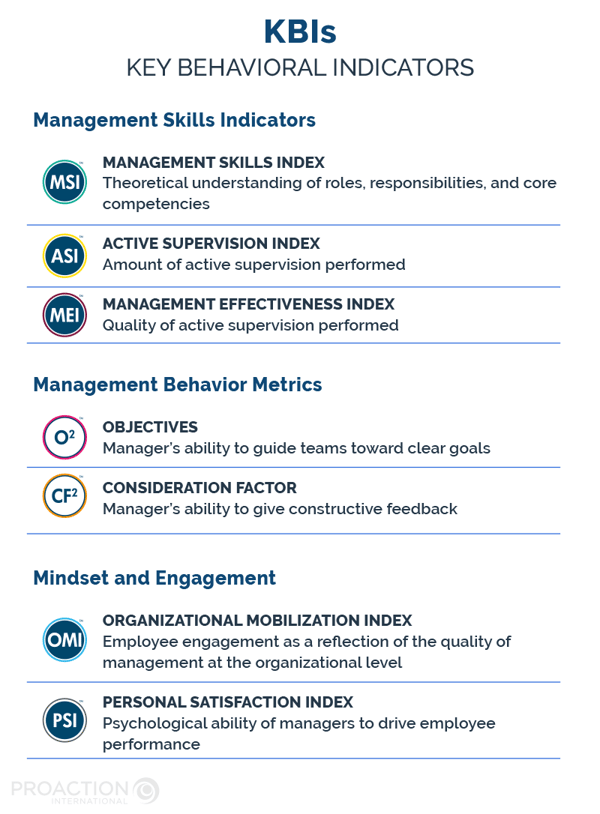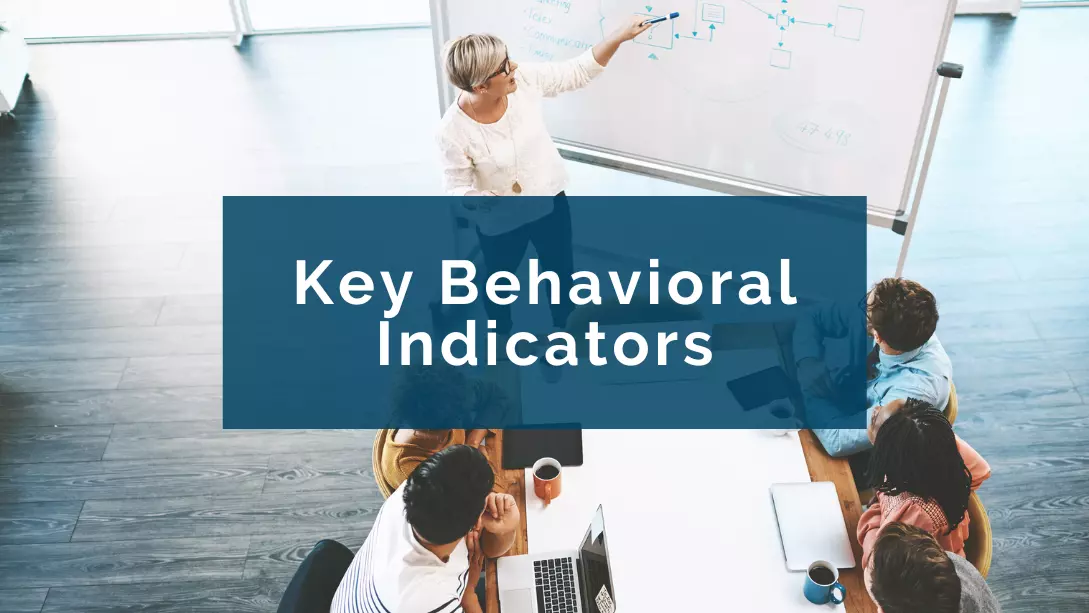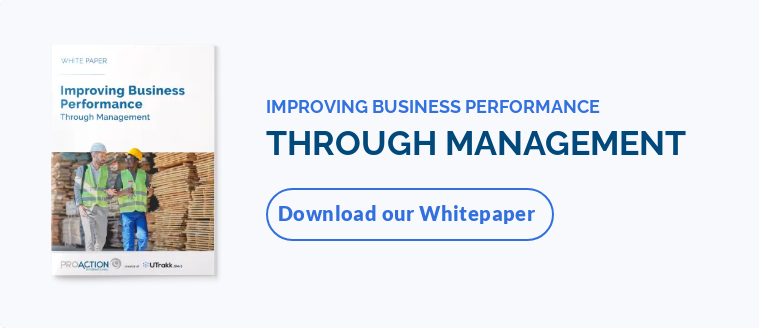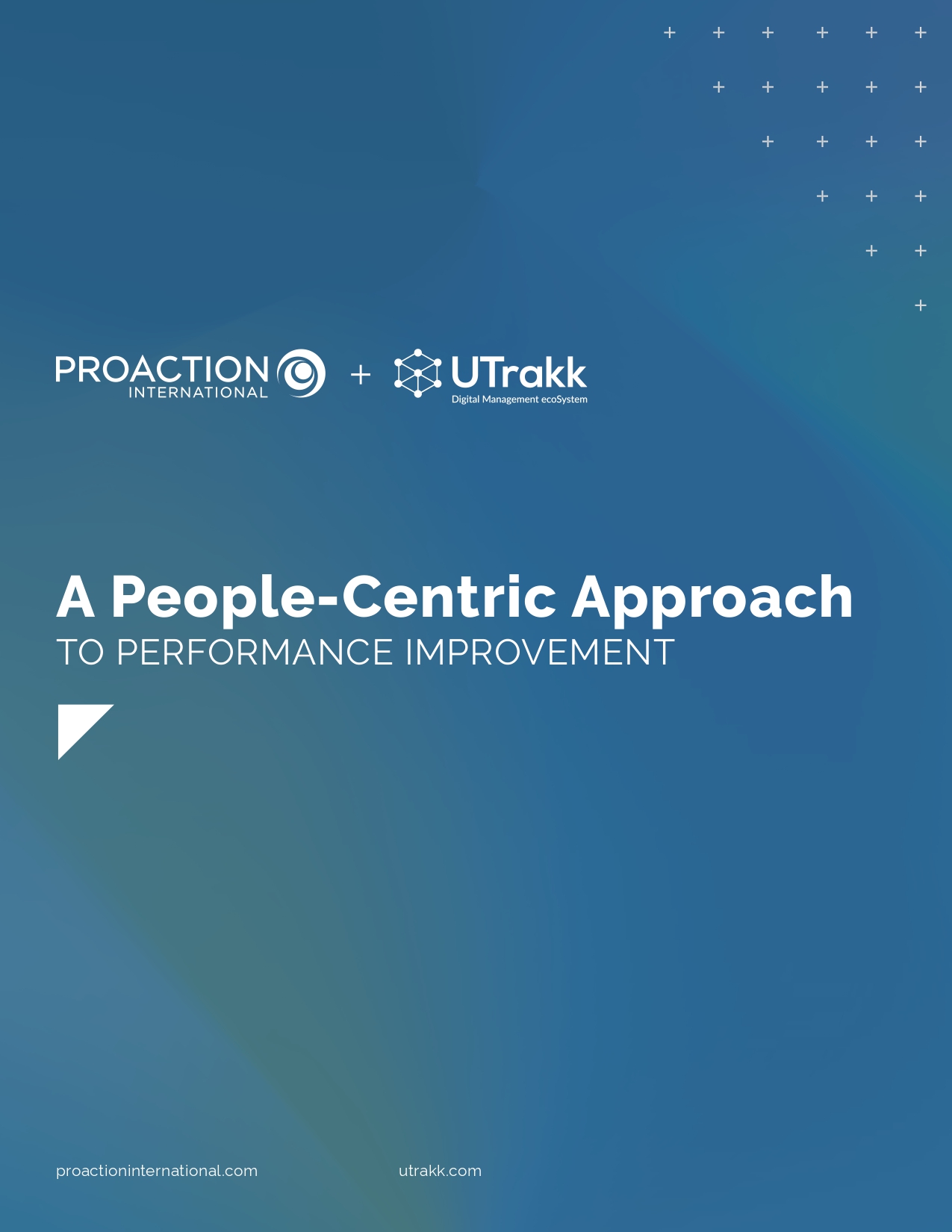The importance of mastering the best management behaviors
Even in this era of technology, human beings are still essential in delivering performance excellence. Most companies tend to focus primarily on processes and technology instead of resources' skills and abilities. However, it is critical to remember that people have managed, supported, and benefited from innovations in any era, but they are the real engines of change. Humans are the drivers of organizational success.
Using KBIs enables us to build on what is really at the heart of an organization: the people. They are what generate performance.
High performance within an organization means making sure managers are using good “behaviors” in the same way an athlete would train to win at the Olympics. Key behavioral indicators allow you to measure the different facets of the knowledge and behaviors of a proactive, effective manager. These important behavioral indicators show the impact of adopting the best management practices daily.
Measuring: The first step towards improving
As a manager, you always need to ask yourself: "Am I implementing the best practices to manage the company in an optimal way?" (whether it is “4.0” or not)
The methodology behind KBI measurement allows you to create a portrait of your managers' technical and human capabilities.
This assessment is the starting point of an improvement process that aims to perfect management skills and pinpoint areas that need working on. It sets a personalized competency framework to help enhance the managers’ contribution and added value for the organization, ultimately guiding them up to the required level of operational performance.
Key behavioral indicators collect data to measure the right behaviors, offering insight into improvement opportunities. Let's bring again the athlete analogy. When an athlete starts their physical training, their performance is measured using some indicators as a baseline. Overtime, these indicators will be re-evaluated as the athlete progresses towards their desired performance results.
Keep in mind: You will forget what you don’t measure.
Examples of organizational key behavioral indicators
KBIs are used to assess different aspects of management in organizations. Here are some examples of key behavior indicators:

Management skills indicators
-
Management Skills Index (MSI): The theoretical understanding of roles, responsibilities, and core competencies.
-
Active Supervision Index (ASI): The amount of active supervision performed.
-
Management Effectiveness Index (MEI): The quality of active supervision performed.
Want to learn more about these three indicators of management competence? Read our article.
Management behavior metrics
-
Objectives: The manager’s ability to show behavioral competencies and to guide their teams towards clear organizational goals.
-
Consideration factor: The manager’s ability to provide feedback in a constructive way.
We discuss these two metrics in more details in this article.
Mindset and engagement
-
Organizational Mobilization Index (OMI): Employee engagement as a reflection of the quality of management at an organizational level.
-
Personal Satisfaction Index (PSI): The psychological ability of managers to drive team performance and employee performance.
To dive deeper into employee engagement and how to measure it, check out this article.
Achieving high performance and continuous improvement in management
These organizational key behavioral indicators allow your managers and company to identify areas for improvement in order to growth in a proactive and sustainable way.
Usually, a manager is more comfortable with the technical side of their role. A manager in a leadership development process need to incorporate the "human" element into their management routines and find a balance between technical expertise and employee engagement. Engaging employees on a daily basis helps organizations get closer to reaching their full potential.
Sometimes, the leader or manager is not fully appreciated amongst frontline employees. The autocratic type of leader, who stands out for their authority and total control, has to be transformed into a leader who takes responsibility, who is involved in their employees' development, and who is willing to support them.
Today's leaders must be supportive, motivating and guide their workforce with compassion, taking into account the strengths and weaknesses of each team member. They also have to show adaptability, anticipate issues, and adopt a problem-solving approach to resolve issues in a timely manner.
To achieve higher organizational performance and drive long-term success, managers must master the art of combining know-how and interpersonal skills. Implementing best management practices and customized managerial coaching can greatly help change behaviors and perpetuate that change.
Harnessing the positive impact of KBIs on business performance
With the help of coaching and key behavioral indicators, transforming management practices on the manufacture floor can have a significant impact on the whole organization:
-
Improvement of key performance indicators (KPIs) and key financial indicators (KFIs), which results in increased financial growth;
-
Better employee engagement as team members feel involved and valued, and that their contributions positively impact day-to-day performance;
-
Increased efficiency across the organizational, with employees and managers working towards clear objectives, roles and responsibilities.
The significance of human-centric management cannot be overstated. Key behavioral indicators (KBIs) spotlight the value of combining technical know-how with interpersonal skills, offering a roadmap to managerial excellence.
By regularly measuring and analyzing these indicators, organizations can pinpoint areas of improvement, fostering both employee engagement and operational efficiency. The integration of KBIs into managerial practices not only boosts performance metrics but also fortifies the organizational structure. Ultimately, for a business to thrive, it must recognize and harness the dual power of technical proficiency and human connection.










